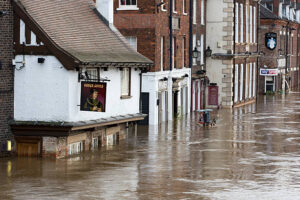From record-breaking heatwaves... to biblical flooding
The effects of Climate Change are definitely being felt around the world. Think about the floods of biblical proportions, and the annual forest fires that can't be controlled. Each record being broken is a step closer to an environmental collapse.
Do you think that 2050 is too distant to care about? It's not, but you would not think that if you listened to the world leaders. Their soundbites are constructed to relay a very optimistic message: '...there is no climate emergency'. The analogy of the Boiling Frog springs to mind here.
If searingly hot, killer summers and deadly monsoon seasons are to be the fate of the UK, can we really adapt and mitigate the worst of it?
The assumption is that we are so clever and inventive we can surely develop the necessary technological solutions in the nick of time. Maybe we can, but when will this happen and... how much will it cost?
A ten-year weather prediction
Let's take endless heatwave summers as a starting point and imagine the UK in 10 years time. In this predicted July, the temperatures are 45 degrees+ for several weeks. Well, what is the upper limit? Apparently, it depends on temperature and humidity. But, even if a 45 degree+ temperature outside is bad, what's happening inside? What about the third skin: e.g. your home, your workplace? Current building regs are only just coming to terms with overheating and nothing really is being said about retrofitting all existing homes with solar shading or heat rejection techniques.
In its simple form, cooling the building down at night, and shutting the blinds/closing curtains during the day, can make a difference. What about moving and cooling the internal air. Apart from air conditioning or Reversible heat pumps – what about ceiling fans? The idea of a passive stack ventilation and cooling system isn’t a simple matter (based on hot air rising and pressure differentials) but strategically designed/placed extraction could be a good solution.
Water stress... and waste
The predictions for the UK (and Europe) at 1.5 degrees of global warming don’t look nice, and we are likely to breach them in the next 8-15 years. Unfortunately, we are on track to overshoot maybe over 2 degrees (the IPCC report states this clearly). Water and its use will be a challenge for all. Politically, there must be a review of how to fix 30% of wasted water due to leaky pipes. The solutions and mitigations are basic but effective.
The PRL solution
We at PRL have been experimenting with the next generation of solar blinds, they are not pretty - but point to the future - our simple calculations show an at least 30% reduction in energy use and maintaining internal temps to acceptable levels.
What about conserving water or harvesting it for future use - nine months isn't that far away. It's time to seriously think about measures to survive the next summer. But, doesn't it seem ironic to talk about being too hot, saving water and the like -
particularly when it's going to be a very wet autumn? Pakistan just experienced a devastating flood. The Pakistan government recognised that inadequate planning, poor, non-resilient homes and infrastructure made things much worse.
Faced with the prospect of massive flooding in UK what are people to do here? Sand bags are not the answer by the way... so, just what is the retrofit solution?
PRL are also experimenting with a more resilient specification of materials for property protection, particularly in known flood zones, (for example, those that don't specify timber flooring on a ground floor) - but there are many other infrastructure solutions we need to invest in now as a nation. These include water surge protection - diversion through Suds and maintaining emergency power / clean water. Ideally, planning should restrict or even ban the building new properties in flood plains. A bit too obvious? But, it's still being permitted. It's noted that some authorities are now providing policy guidance but there is nothing in building regs just yet.
Preparation is key
In summary, this is all about preparing and planning for climate change as if its an emergency, the fact that heatwaves and flooding are the two sides of the same coin should be making national news. REAL politics should be focused on real problems which will protect the people locally and internationally (not just small special interest groups).
What are you doing about flooding and drought? Or, do you think there is still time to plan for that?
Maybe it's time to think again.
Carl Dodd, Property Revolutions Ltd.


